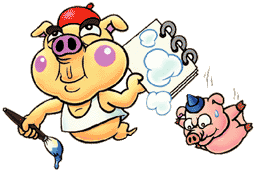Hoggus
| Hoggus | |
|---|---|
 Artwork of Hoggus and a Butatabi | |
| Species | Pig |
| First appearance | Wario Land 4 (2001) |
- “This is one filthy little pig! He comes flying in from the sky dropping little pigs on you!! He brags about being a great painter, but trust me–his personality is anything but great! I know, because I'm so charming, right?! Whatever!! I just wish he'd wear pants!! It's only polite, don't you think?!”
- —Wario, Wario Land 4 instruction booklet
Hoggus[1] is an enemy in Wario Land 4. He is encountered in Doodle Woods only. Hoggus resembles a humanoid pig, but instead of having feet, he has a wispy tail similar to a ghost, much like the game's bosses (except for Spoiled Rotten). Hoggus wears a white shirt and a red hat and can be always seen with his paintbrush and sketch block. In the outer areas of Doodle Woods, Hoggus flies around and paints two different types of pigs on his sketchbook which come to life. They are smaller than Hoggus and do not have a ghostly appearance. The first type is named Denden and wears a spiky shell and rolls after Wario to attack him. The second type, known as Butatabi, has a spike on its head and floats from right to left and inversely. Both can be defeated by Wario. Hoggus himself does not harm Wario, but is also invincible. Hoggus flies away when Wario gets into one of the caves of Doodle Woods. After painting, Hoggus makes a sad face. The ending sequence shows a picture of Hoggus drawing in a book with Wario.
In Super Mario-kun, Hoggus appears in a bigger role as being an ally of Wario.
Gallery
Names in other languages
| Language | Name | Meaning | Notes |
|---|---|---|---|
| Japanese | キヨブー[2] Kiyobū |
Likely from the first name of Japanese artist「山下清」(Yamashita Kiyoshi, Kiyoshi Yamashita) or surname of Nintendo designer「清武博二」(Kiyotake Hiroji, Hiroji Kiyotake), and「ブーブー」(būbū, onomatopoeia for oinking) | |
| Chinese | 图画飞猪[7] Túhuà Fēizhū |
Paint Pig | |
| French | Hoggus[4] | - | |
| German | Hoggus[5] | - | |
| Italian | Porcolfiera[6] | From procellino ("pig") and mongolfiera ("hot air balloon") | |
| Spanish | Porkus[3] | The word "pork" transformed into an Ancient Greek/Roman name |
References
- ^ 2001. Wario Land 4 instruction booklet. Nintendo of America (American English). Page 38.
- ^ 2001. Wario Land Advance: Yōki no Otakara instruction booklet. Nintendo (Japanese). Page 33.
- ^ 2001. Wario Land 4 instruction booklet. Nintendo of Europe (European Spanish). Page 103.
- ^ 2001. Wario Land 4 instruction booklet. Nintendo of Europe (French). Page 63.
- ^ 2001. Wario Land 4 instruction booklet. Nintendo of Europe (German). Page 43.
- ^ 2001. Wario Land 4 instruction booklet. Nintendo of Europe (Italian). Page 123.
- ^ 瓦力欧寻宝记. iQue (Simplified Chinese). Retrieved July 7, 2024.


